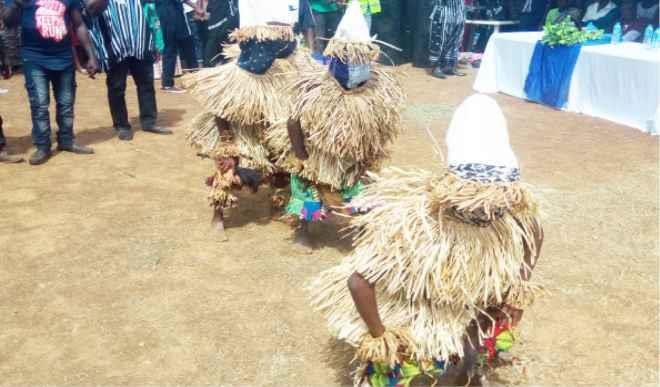
The Gbari natives of the Federal Capital Territory (FCT) have a rich culture and tradition just like other ethnic groups in Nigeria. Despite the fact that urbanization has changed their environment and landscape, they still hold dear to their cultural norms and values, and find time to showcase and celebrate their unique festivals.
The Gbari natives, who are predominantly farmers, are among the nine ethnic groups indigenous to the Federal Capital Territory.
On Saturday April 7, 2018, Gbari natives from across the six area councils converged on a mini stadium in Kwali to display their culture and tradition, which they tagged ‘Gbari Cultural Carnival’.
The carnival attracted prominent sons and daughters of the Gbari ethnic group, as well as top politicians, academicians and technocrats from various parts of the country who converged to witness the cultural display.
The event, which paraded different kinds of masquerades, including under-aged children dressed as masquerades, had local Gbari musicians on ground to entertain guests.
Speaking at the occasion, the Etsu of Kwali, Alhaji Shaban Nizazo (III), said the Gbari Cultural Carnival was organized to serve as a symbol of peace and unity among Gbari sons and daughters, including those in the diaspora.
He said though it was worrisome that the Gbari culture and tradition was going into extinction because of urbanization, it had become necessary for them to strive to sustain it.
According to him, the Gbari Cultural Carnival was also an avenue to educate the youth on their background and root, which he said would help them sustain the culture.
“We are not isolated, as we are Nigerians and must also cooperate with other ethnic groups for the development of the country, but more importantly, we must sustain the Gbari culture and tradition which is gradually eroding, “ he said.
Also speaking, the chairman of the council, Mr. Joseph K. Shazin, promised to promote the culture of the natives of the FCT in order to ensure continuity.
He said his administration would ensure it sustains and reinvigorates the Gbari cultural carnival through encouraging the promoters of the event.
The chairman said it was unfortunate that Gbari cultural artifacts are fading by the day, and called on the elders to revive it.
“The reinvigoration of the Gbari culture and its sustenance should be a point of duty especially by our elders so that the younger ones would sustain it,” the chairman said.
The commissioner representing the FCT in the Public Complaints Commission (PCC), Danladi Etsu Zhin, called on the National Assembly to come up with a bill that will include the culture of the natives of the FCT.
He said the organizing of the Gbari cultural carnival came at the right time, to promote and encourage harmonious relationship among not only the Gbari natives but other ethnic groups in the FCT and the county at large.
Dr. Midah Kwali Ayuba, in a paper he presented at the occasion titled “Effects of Foreign Religion on the culture of the Gbari people” said the Gbari values are cherished tradition and ethos which are desirable to the society and taken as normative civilization.
According to him, the Gbari value submissive character of discipline, re- disposition to obey orders and fulfill responsibilities, which he said was reinforced through organization of age grades, to favor the well behaved and punishment for deviants.
“Also, one of the things that the Gbari believe aside from religion is hard work and self reliance. Honor has also been on top of their life agenda as their whole existence is guided by the sense of shame in things spiritual and moral,” he said.
He explained that in Gbari traditional society, a person would rather starve to death than relying on others for food, saying reliance on others for anything is considered as humiliating to the individual in addition to bringing dishonor to the entire family.
He added that “idleness and laziness are not only abhorred, they are treated as taboos. No wonder in the Gbari communities, the disabled are kept within the family household and fended for by the extended family.”
Dr. Midah noted that the Gbari culture has sustained the people for the generations, “but the two imported religions came heavily on the Gbari cultural world bringing about a bartering and shattering experience and irreparable cultural trauma.”
According to him, the effect is regarded as the conquest of the traditional culture in history when the whirlwind of the cross current of the two faiths bartered and shattered the ancient crust of the traditional Gbari cultural phenomenon.
He, however, observed that Gbari scholars, commentators, elites, elders, and youth and the highly placed as well as sympathizers have expressed doubt and worries over the solidarity of the Gbari social structure.
“But today, the two foreign religions have brought about the decline of the Gbari traditional world, the undoing of the old cultural set up and the rapid erosion of old values. The Gbari culture, therefore, is fast running into extinction and something must be done to stop this,” he said.
He added, “today, instead of the Gbari people to relate with their brothers and sisters using cultural affinity, they use the force of religion to identify themselves, instead of a Gbari man identifying himself first as a Gbari person, he uses the force of religion in defining his identity.”

 Join Daily Trust WhatsApp Community For Quick Access To News and Happenings Around You.
Join Daily Trust WhatsApp Community For Quick Access To News and Happenings Around You.


